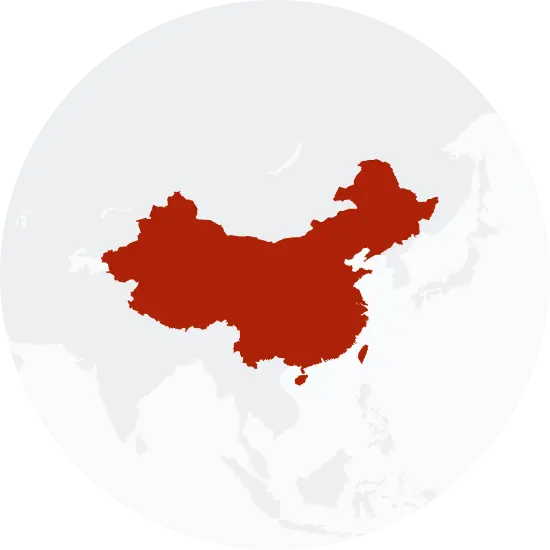Explore the Family Name Qi
How common is the last name Qi in the United States?
According to the Decennial U.S. Census, the popularity of the surname Qi has notably increased from 2000 to 2010. In 2000, Qi was ranked 22,521 in popularity and by 2010, it had jumped to position 13,042. This significant shift represents a rise of 42.09%. Concurrently, the count of people with the Qi surname more than doubled from 1,066 in 2000 to 2,354 in 2010, indicating a surge of 120.83%. The proportion of people with this surname per 100,000 also increased from 0.4 to 0.8 during this period.
| 2000 | 2010 | Change | |
|---|---|---|---|
| Rank | #22,521 | #13,042 | 42.09% |
| Count | 1,066 | 2,354 | 120.83% |
| Proportion per 100k | 0.4 | 0.8 | 100% |
Race and Ethnicity of people with the last name Qi
When it comes to the ethnic identity associated with the surname Qi, data from the Decennial U.S. Census suggests that it is predominantly connected with the Asian/Pacific Islander community. In 2000, an overwhelming 98.03% of individuals with the surname identified as Asian/Pacific Islanders, a number slightly decreased to 97.62% by 2010. The second most common ethnicity for this surname was White, which saw a growth from 1.03% in 2000 to 1.36% in 2010. There was also a slight increase in those identifying as two or more races, rising from 0.66% to 0.76%. In 2010, there was a small representation of Hispanics with the surname Qi, while other ethnic identities such as Black and American Indian and Alaskan Native were not reported.
| 2000 | 2010 | Change | |
|---|---|---|---|
| Asian/Pacific Islander | 98.03% | 97.62% | -0.42% |
| White | 1.03% | 1.36% | 32.04% |
| Two or More Races | 0.66% | 0.76% | 15.15% |
| Hispanic | 0% | 0.21% | 0% |
| Black | 0% | 0% | 0% |
| American Indian and Alaskan Native | 0% | 0% | 0% |
Qi ancestry composition
23andMe computes an ancestry breakdown for each customer. People may have ancestry from just one population or they may have ancestry from several populations. The most commonly-observed ancestry found in people with the surname Qi is Chinese, which comprises 88.6% of all ancestry found in people with the surname. The next two most common ancestries are Manchurian & Mongolian (5.2%) and Korean (4.5%). Additional ancestries include Chinese Dai, Central Asian, Iranian, Caucasian & Mesopotamian, Anatolian, and Bengali & Northeast Indian.
Ready to learn more about your ancestry? Get the most comprehensive ancestry breakdown on the market by taking our DNA test. Shop 23andMe
| ANCESTRY BREAKDOWN | COMPOSITION |
|---|---|
| Chinese | 88.6% |
| Manchurian & Mongolian | 5.2% |
| Korean | 4.5% |
| Other | 1.7% |

Possible origins of the surname Qi
Your DNA provides clues about where your recent ancestors may have lived. Having many distant relatives in the same location suggests that you may all share common ancestry there. Locations with many distant relatives can also be places where people have migrated recently, such as large cities. If a large number of individuals who share your surname have distant relatives in a specific area, it could indicate a connection between your surname and that location, stemming from either recent ancestral ties or migration.
Based on 23andMe data, people with last name Qi have recent ancestry locations all within China.
| RECENT ANCESTRY Location | Percentage |
|---|---|
| Zhejiang, China | 16.80% |
| Fujian, China | 16.80% |
| Guangdong, China | 16.80% |
| Hebei, China | 16.80% |
| Sichuan, China | 16.80% |
What Qi haplogroups can tell you
Haplogroups are genetic population groups that share a common ancestor on either your paternal or maternal line. These paternal and maternal haplogroups shed light on your genetic ancestry and help tell the story of your family.
The top paternal haplogroup of people with the surname Qi is O-F8, which is predominantly found among people with East Asian & Indigenous American ancestry. Haplogroup O-F8 is descended from haplogroup O-M1359. Other common haplogroups include O-F265 and O-F11, which are predominantly found among people with East Asian & Indigenous American and East Asian & Indigenous American ancestry. Other surnames with similar common haplogroups are: Hao, Jia, Shih, Yin, Lim, Ren, Lam, Cui, Su, Qin.
The most common maternal haplogroups of people with Qi surname are: M, G2a, D4. These most commonly trace back to individuals of East Asian & Indigenous American and European ancestry.
 Paternal Haplogroup Origins O-M1359
Paternal Haplogroup Origins O-M1359
Your paternal lineage may be linked to the Han Chinese
Haplogroup O-Page23 has been found in several populations of the Han Chinese ethnic group. The ancestors of the Han, called the Huaxia, lived in the upriver basin of the Yellow River 5,000-6,000 years ago. As agricultural technology improved, the Huaxia spread east and south, and became the Han Chinese. Over the last 2,000 years, there have been three major migrations of the Han southward. The first of these migrations occurred during the Jin Dynasty from 317 to 420 CE, when nearly one million people moved south. A second migration occurred during the Tang Dynasty, after the An-Shi Rebellion, between 755 and 762 CE. The last migration occurred during the Southern Song Dynasty, from 1127 to 1297 CE, when nearly 5 million people migrated southward. The Pinghua, a branch of Han in which haplogroup O2a2b1a1 is particularly common, may be descendants of indigenous minority groups that adopted Han culture during one such major migration event.
Your maternal lineage may be linked to the ancient people of the Indian subcontinent
While Haplogroup M is widespread throughout South and East Asia, it is more diverse on the Indian sub-continent than anywhere else in the world. The high degree of diversity of M in India is likely tied to its ancient arrival here nearly 50,000 years ago. In addition to M2, which is found throughout the subcontinent, there are dozens of haplogroups branching off of M that exist in India. These branches are often connected to specific regions, tribes, or ethnic groups. For example, haplogroup M18 is found among the Oraon peoples of eastern India and Bangladesh, while haplogroup M41 is common among the Pardhan speakers of eastern India, and haplogroup M31a can be found on the Andaman Islands, just off the southeast coast of India.

What do people with the surname Qi have in common?
Spoiler alert: it's complicated. People with the same last name are usually no more genetically similar than a randomly sampled group of people from the same population. That said, people with the same surname are more likely to have similar ancestries than randomly sampled individuals. The reason is the tendency of people with similar cultural or geographical backgrounds to preferentially mate with one another. That's why people who share a surname may be more likely to share traits and tendencies in common than people within the general population. Check out the percentages below to see the prevalences of tastes, habits, and traits of people with your surname compared with prevalences among 23andMe users.
Preferences
Traits
Habits

Sugary Drink
Drinks one or more sugary drinks per day.
"Qi" Surname 21.4%
23andMe Users 21.1%
Are health conditions linked to the last name Qi?
The short answer is that, if there is an association between surname and health, it's usually more about your ancestry than your name. Individuals with a given surname are no more genetically similar than the general population but often have similar ancestries. The populations of people associated with those shared ancestries often have sets of genetic variations, also known as alleles, in common. Some of those alleles are associated with a greater likelihood of developing certain diseases.
Disease variant frequency by ancestry
Disease allele frequencies in populations associated with the surname Qi are shown below. Important Note: not everyone with a disease allele will develop these health condition




